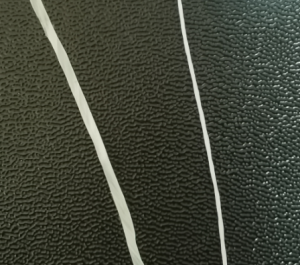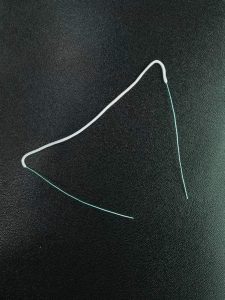Does Foss Thickness Matter?
The thickness or gauge of dental floss can matter depending on your individual needs and preferences. Dental floss comes in various thicknesses, typically measured in millimeters or denier (a unit of measurement for the fineness of yarn or thread). Here’s how floss thickness can impact your flossing experience:
Glide between teeth
Thicker floss tends to be more effective at cleaning between teeth and removing plaque and debris. It can be especially helpful for people with larger gaps between their teeth.
Tight spaces:
Thinner floss can be useful for people with tighter gaps between their teeth, as it can more easily fit into those spaces.
Gums sensitivity:
If you have sensitive gums, you might prefer a thinner floss, as it may cause less irritation when used gently.
Strength:
Thicker floss is generally stronger and less likely to break during use, which can be beneficial for people with dental work like bridges or braces.
Preference:
Some people simply prefer the feel of one thickness over another, and it might encourage them to floss more regularly.
How Thick is Dental Floss in MM?/ Are There Different Thicknesses of Floss?
Dental floss typically comes in various thicknesses, usually measured in millimeters (mm) or sometimes in denier (a unit of measurement for the fineness of yarn or thread). The thickness can vary from brand to brand and type to type. Here are some general guidelines for dental floss thickness:
Regular Floss:
Regular dental floss is usually around 0.2 to 0.3 mm in thickness. This is a common thickness that works well for many people.
Waxed Floss:
Waxed dental floss can also fall in the range of 0.2 to 0.3 mm in thickness. The wax coating helps the floss glide more easily between teeth.
Unwaxed Floss:
Unwaxed dental floss might be slightly thinner, around 0.1 to 0.15 mm in thickness. It’s generally a bit finer and may be preferred by those with tight spaces between their teeth.
Dental Tape:
Dental tape is wider and flatter than regular floss, measuring around 0.5 mm in thickness. It’s designed to cover a larger surface area and is often preferred for people with wider gaps between teeth.
Super Floss:
Super floss is a specialized type of floss that includes a stiff end for threading under dental appliances like braces, as well as a spongy portion and regular floss. The thickness can vary depending on the brand.
What is The Thinnest Dental Floss?
The thinnest dental floss available is typically referred to as “ultra-fine” or “extra-thin” floss. This type of floss is designed to be very slender, making it suitable for individuals with tight spaces between their teeth or those who prefer a finer flossing experience. The thickness of ultra-fine dental floss can vary between brands, but it is generally around 0.05 to 0.1 mm in diameter.
Ultra-fine dental floss can be especially helpful for people with closely spaced teeth, orthodontic appliances like braces, or sensitive gums that might be irritated by thicker floss. Keep in mind that while ultra-fine floss can be effective for certain individuals, it may require a bit more care when using to avoid breakage.
As floss thickness can vary between brands and product lines, the thinnest dental floss from Fenghe is UHWMPE floss. it’s a good idea to check the packaging or product information to confirm the specific thickness of any ultra-fine dental floss you’re considering. If you’re unsure which type of floss is best for your oral health needs, consider consulting your dentist or dental hygienist for personalized recommendations.
What is The Thickest Dental Floss?
The thickest type of dental floss available is often referred to as “dental tape.” Dental tape is wider and flatter than regular floss, which allows it to cover a larger surface area between teeth. It is designed for people who have wider gaps between their teeth or who prefer a broader flossing experience. The thickness of dental tape can vary between brands, but it is generally wider than regular floss and may be around 0.5 mm in width.
Dental tape can be particularly useful for individuals with dental work like bridges, implants, or wider spaces between teeth, as it can effectively clean those areas. It’s important to note that while dental tape is wider than regular floss, it still needs to be used correctly to ensure thorough cleaning and gum health.
Selecting the right dental floss thickness, also known as “floss gauge,” is essential for effective and comfortable flossing. The thickness you choose depends on factors such as the spacing between your teeth, your personal comfort, and any specific oral health considerations.
Ultimately, the right dental floss thickness is the one that allows you to clean between your teeth comfortably and effectively while addressing your specific oral health needs. Regular flossing, regardless of the thickness, is key to maintaining optimal oral hygiene and preventing gum disease.



